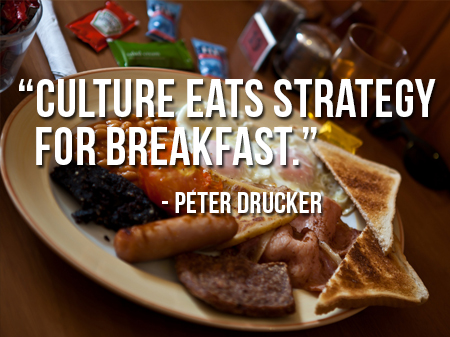
Note from Beth: I was thrilled to be interviewed by Steve along with many other nonprofit data nerds, for his new book, Data Driven Nonprofits. He was kind enough to send me an advanced copy and it is definitely a must read. So, check out this post and be sure to order a copy today!
Culture Eats Big Data for Lunch – Guest Post by Steve MacLaughlin
Why do some organizations struggle to manage their data? Why do other nonprofits extract a lot of value out of their information? Why do some get overwhelmed in the deluge of data flowing from their systems? How is it that others have harnessed data to drive better decision making?
These are some of the questions that I set out to answer in my new book Data Driven Nonprofits. For nearly two years now, I’ve been on a journey to understand why nonprofits are not more mature when it comes to their use of data. Along the way, I interviewed more than 20 nonprofit experts from a wide variety of organizations.
SECRETS TO SUCCESS
Perhaps the key to Big Data success can be found amongst the myriad of technologies and terminologies that exist today: Hadoop. Hive. Spark. Pig. Kafka. Machine Learning. Natural Language Processing. Algorithms. Predictive Analytics. Internet of Things. Data Health. Business Intelligence. Unstructured Data. NoSQL. Petabyte. Latency. Confabulation. Data Science. Yes, the technology is important. Yes, the skills are important. Yes, having the right data is important. But none of these are enough without one very important secret ingredient.
The business management guru Peter Drucker is often quoted as saying “Culture eats strategy for breakfast.” Truer words have never been spoken. It is also clear that culture eats Big Data for lunch. Any strategy or plan to use Big Data is likely to be devoured if the culture of an organization is not supportive. As it turns out, culture plays an important role in the ability for nonprofit organizations to use data to their advantage.
Now, culture is also an overused term these days. For some it is a mystical force within an organization and for others it’s an excuse to blame the status quo. That’s why I turned to Beth Kanter during the course of writing the book to get a better understanding of the importance and power of culture. She helped me to understand the importance of behaviors, rituals, and mindsets that shape the culture of any organization. Time and time again, I found that the culture of a nonprofit was the secret to their success of being more data driven.
ALL SHAPES, SIZES, & MISSIONS
I found successful data driven organizations across nearly every sub-sector including higher education, international relief, religious, medical research, healthcare, human services, mental health and crisis intervention, community improvement and capacity building, environmental, and animal welfare.
What I found was that these organizations all had made data a priority. They were all using a mix of technology, skills, and strategies. But what stood out was the important role culture played in these nonprofits using data to drive better results.
The good news is that there is no one-size-fits-all when it comes to organizational culture. Instead, there are multiple culture types that create the right environment for data driven nonprofits to take shape and grow. There are at least seven different major culture types of successful data driven nonprofits:
Culture of Champions: There is support from the organization’s leadership and motivational members of the staff that embrace being data driven.
Culture of Testing: There is a belief that measurable improvements can be made through iteration and testing throughout the organization.
Culture of Change: There is a natural curiosity to try new things and take calculated risks to adapt to changing conditions in the nonprofit sector.
Culture of Sharing: There is a willingness to share data and collaborate to achieve better results and a disdain for creating or maintaining data silos.
Culture of Growth: There is a focus on continuous improvement where success is measurable and visible across all levels of the organization.
Culture of Agile: There is empowerment of people to interact and collaborate that allows them to adapt and respond to a changing environment.
Culture of Data: There is a high value placed on data and it is a fundamental driving force to support and validate decisions at the nonprofit.
Data Driven Nonprofits explores each of these culture types through first-hand stories from nonprofit organizations like Memorial Sloan Kettering Cancer Center, University of South Dakota, Indiana University, Worldwide Cancer Research, SCIAF, Royal National Institute of Blind People, Project HOPE, Denver Rescue Mission, Florida State University, Humane Society of the United States, VolunteerMatch, Crisis Text Line, and charity: water.
These nonprofits are accelerating change in the world by staff using data to influence strategy and inform decisions that produce value and impact. All of these organizations have invested in people, process, data, and technology. But having a culture that supports the right habits, incentives, behaviors, and mindsets is the common denominator of success.
Steve MacLaughlin is a Director of Analytics at Blackbaud and is considered an expert on the nonprofit sector. His views on the philanthropic world have appeared in The New York Times, The Washington Post, USA Today, The Los Angeles Times, and on National Public Radio. MacLaughlin serves on the board of the Nonprofit Technology Network (NTEN) and is a frequent speaker at conferences and events. Steve earned both his undergraduate degree and a Master of Science degree in Interactive Media from Indiana University. His newest book, Data Driven Nonprofits, was published in 2016.

Leave a Reply